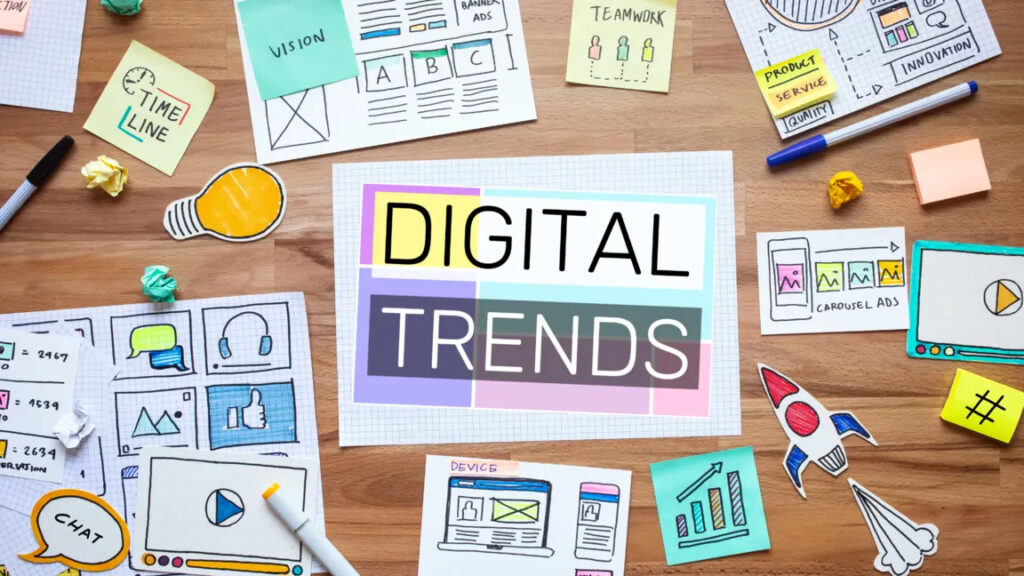From traditional newspaper ads to the advent of artificial intelligence, the marketing world is in constant flux, shaped by evolving technology and changing consumer preferences. In the fast-paced landscape of 2024, marketing leaders need to anticipate and adapt to emerging trends to maintain a competitive edge. Let’s delve into 13 key marketing trends and strategies to define the year ahead.
Marketing at scale with AI
Artificial intelligence is taking centre stage in marketing, revolutionizing how teams drive revenue and bring strategies to the market. As generative AI tools like ChatGPT gain prominence, marketers in 2024 will embrace new technologies to enhance efficiency and speed in executing campaigns.
1. Trendspotting and data analysis
The Work Innovation Lab’s research highlights a shift, with 30% of employees already utilizing AI for data analysis and a staggering 62% expressing a desire to employ AI. Leveraging AI-driven data models and machine learning enables marketers to:
- Optimize spending and refine marketing efforts through targeted advertisements.
- Formulate informed plans with precise trend identification and predictions.
- Gain a deeper understanding of buyer behaviour.
- Enhance customer retention and loyalty by delivering tailored content to the right audience.
2. Streamlining day-to-day marketing tasks
AI’s true boon lies in expediting routine tasks, as showcased by the 25% of employees currently leveraging AI for administrative functions, a number anticipated to double to 57%. The anticipated productivity enhancements in 2024 include:
- Automations facilitate instant initiation, assignment, and handover of tasks.
- Virtual assistants aiding in message creation, status report drafting, and synthesizing campaign information.
- Ongoing improvements to generative AI tools, exemplified by advancements in tools like ChatGPT, assisting in content creation, image and video development, and more.
Incorporating AI into the marketing tech stack is imperative for capitalizing on these opportunities. Simultaneously, investing in training is essential to alleviate fears and ensure the safe utilization of AI technology.
3. AI-driven customer interactions and conversational marketing
Conversational marketing, employing targeted messaging and AI automation for real-time engagement, signifies a pivotal digital marketing trend. Intelligent chatbots, powered by machine learning and natural language processing, transform customer interactions. As modern consumers demand immediate gratification, businesses use AI-driven conversational marketing to elevate customer satisfaction and drive conversions.
4. New targeting solutions
With Google phasing out third-party cookies in 2024, brands are exploring alternative targeting solutions. AI modelling is set to play a crucial role in predicting and understanding buyer behaviour for creating personalized content and ads.
5. Long-term influencer-brand relationships
Influencer marketing continues to thrive, with a 29% growth in 2023. Expect brands to deepen relationships with influencers in 2024, leveraging their trust to increase brand awareness and set new trends.
6. Live streaming and video-based content
Video-based content takes centre stage in social media marketing, capturing viewer attention more effectively than static posts. Marketers utilise short-form videos from TikToks to Instagram reels to drive engagement and enhance brand awareness among millennials and Gen Z.
Simultaneously, live streaming emerges as a potent marketing trend, with the global market growing to $1.49 billion in 2023, a 20% increase from the previous year. Pairing live streaming with influencer marketing enables potential customers to engage directly with influencers, discussing and purchasing products while immersed in the live stream experience.
7. User-generated content
User-generated content (UGC) is the new word-of-mouth, offering authenticity and customer-driven marketing. Brands incorporating UGC into their strategy benefit from increased trust and engagement, which is particularly valuable for those with tight budgets.
8. Hyper-personalization
In 2024, personalization is paramount. Brands leverage machine learning algorithms to provide tailored content, product recommendations, and advertisements across various touchpoints, meeting the modern consumer’s expectations.
9. Improved user experience across devices
Enhancing user experience (UX) remains pivotal for marketers. Simplifying website layouts, optimizing for mobile, and incorporating current UX design trends ensure a positive interaction, converting potential customers into loyal advocates.
10. Voice search tactics for SEO
Voice search is on the rise, and marketers are adapting to answer users’ queries with conversational content. This SEO strategy ensures that businesses are visible and provide accurate responses in the age of voice-activated digital assistants.
11. VR-based tools and apps
Virtual reality (VR) and augmented reality (AR) are shaping a new era in marketing. Brands are set to leverage these technologies, offering immersive experiences through VR-based tools, apps, and interactive content.
12. Authenticity, especially with AI
As AI becomes integral, maintaining authenticity is key. Customers want to know when they interact with AI, allowing marketers to infuse a human touch into messaging and content, building trust and transparency.
13. Emphasis on trust and consumer privacy
Consumer demand for control over data is growing, emphasizing the need for trust and privacy. Marketers can differentiate themselves by communicating robust data security measures, ensuring customers feel secure in an era of heightened cyber threats.
Conclusion
Navigating the marketing landscape of 2024 requires a keen eye on emerging trends. From the integration of AI to the rise of immersive experiences, staying ahead is crucial for sustained success. Embrace these trends, adapt your strategies, and connect with your audience on a deeper level.
FAQs
How can AI improve marketing strategies in 2024?
AI enhances marketing through data analysis, task automation, and improved customer interactions, providing insights and efficiency.
Why is user-generated content valuable for marketing?
User-generated content adds authenticity, engages customers, and can be a cost-effective strategy, especially for teams with limited budgets.
What role does hyper-personalization play in modern marketing?
Hyper-personalization uses machine learning to tailor content, product recommendations, and ads, meeting the expectations of today’s consumers.
Why is trust and consumer privacy crucial for marketers?
Building trust and prioritizing consumer privacy differentiate brands, addressing the increasing demand for control over personal data.
How can marketers adapt to the phasing out of third-party cookies by Google?
Marketers can explore alternative targeting solutions and leverage AI modelling to predict and understand buyer behaviour for personalized content creation.
